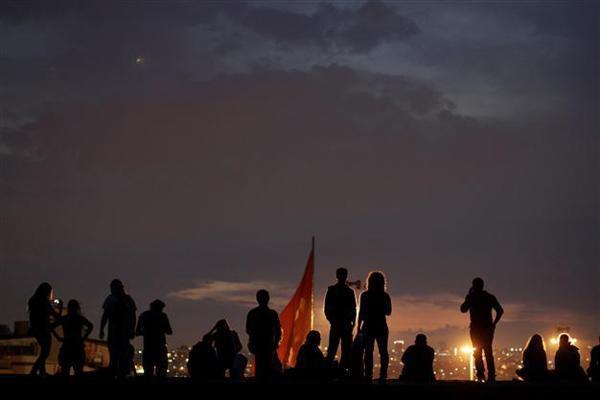Tensions decrease despite some clashes in Gezi Park protests
ISTANBUL


Protesters stand on the roof of Ataturk Cultural center during a protest at Taksim square in Istanbul, June 4. AP photo
Tension seemed to diminish on June 4, as the protests over the demolition of Taksim Gezi Park entered their second week, after spreading to nearly every province in Turkey.The heart of the protests in Istanbul's Gezi Park continued in a more festive mood, a stark contrast to last week's brutal police raids on the area. The protesters who took back the park on June 1 were more organized, as medical and legal assistance teams were set up in the square and park. Unlike in previous days' protests, many young students were seen in the park with their fathers and mothers, or even grandparents. Pop artist Şebnem Ferah also gave a concert during the night.
However, tension was still palpable a few hundred meters further away in the Beşiktaş district, where violent clashes had also broken out over the weekend. Small scuffles took place between protesters and police near the road leading to Taksim.
Ankara, another hot spot of the protests where police had led a brutal crackdown against protesters over the weekend, also saw less incidents. Police forces, who had been instructed not to use tear gas unless they were attacked, held back from intervening, while protesters offered them cloves and took pictures in front of police tanks. However, some clashes were reported near the central Kızılay district around midnight.
The death toll of the incidents across the country also rose to two on June 4, following the death of a 22-year-old protester in Hatay, killed due to a gas canister that exploded and hit his head.
Clashes in eastern town
Meanwhile, violent clashes took place in the eastern town of Tunceli. Protesters threw stones at police stations, with police responding by firing tear gas and water cannons. Many patients in a nearby hospital were affected by the tear gas fired by the police, Doğan News Agency reported.
Tunceli is home to a large number of Alevis, who were highly disturbed that Istanbul's third bridge over the Bosphorus was officially named "Yavuz Sultan Selim" last week. Known in English as "Selim the Grim," Selim was an Ottoman sultan historically known for slaughtering Alevis. Around 300 demonstrators came to Istanbul on June 3 from different Turkish cities, gathering in the Garipçe district in order to stage a protest at the site where the new bridge construction was kicked off last week.
Clashes were also reported in the southern province of Hatay, where tension spiked last month after a twin bomb attack in the town of Reyhanlı, near the Syrian border.
